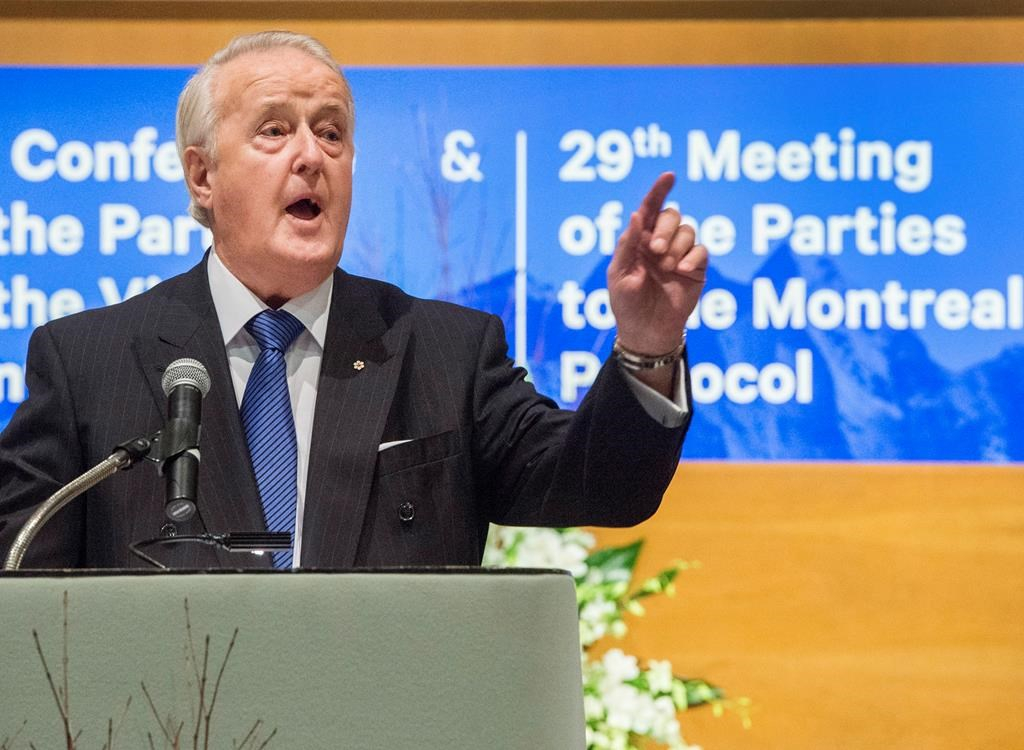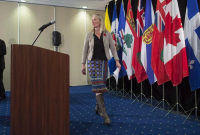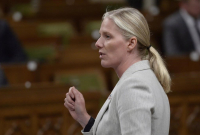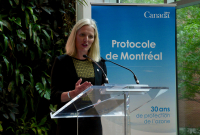Support strong Canadian climate journalism for 2025
An amendment to the Montreal Protocol has been signed that will lower the levels of a type of greenhouse gas that warms the planet even more quickly than carbon dioxide, Environment Minister Catherine McKenna said Monday.
McKenna says implementing the Kigali Amendment could avoid up to 0.5 degrees Celsius of warming by the end of the century.
The objective of the amendment is to reduce the levels of hydrofluorocarbons, which are used in products such as refrigerators, air conditioners and aerosols.
McKenna told reporters the amendment is important because the chemicals are "very polluting greenhouse gases which were causing huge warming."
"The Kigali Amendment is the most concrete action the world can take right now together to reduce global warming," she said.
"It represents half of a degree of warming that we are going to avoid. It's like closing 300 coal-fired plants."
McKenna added she was thrilled to announce the magic number of 20 countries had been reached in order to ratify the amendment so it can come into effect in January 2019.
The federal minister was in Montreal alongside former prime minister Brian Mulroney to mark the 30th anniversary of the Montreal Protocol, which was aimed at protecting the Earth's ozone layer.
Mulroney was prime minister when the agreement was signed.
During a news conference, Mulroney said he expects U.S. President Donald Trump to eventually change the way he sees a number of issues like the environment.
"You know you come into office with certain set views and then a strange thing happens — reality intrudes, in trade, the environment, taxes and so on," he said.
"I think that he'll be moved by the realities of governing and the need to maintain excellent relations with his neighbours and this will have an impact on the decisions he makes."
In a speech to delegates attending the 30th-anniversary meeting, Mulroney zeroed in on climate change and global warming, saying the science is incontrovertible and "the evidence is before our eyes every day."
But he did not mention Trump by name.
The former prime minister pointed to wildfires that have raged in the forests of Alberta, British Columbia and California and hurricanes that have devastated Texas, Louisiana, Puerto Rico and the U.S. and British Virgin islands.
Mulroney added that the United Nations weather agency says 2017 is set to become the world's third warmest year on record, behind only 2015 and 2016.
"Pretty stark warning, pretty compelling evidence, pretty incontrovertible arguments," Mulroney said.
"While there is much to celebrate on this auspicious anniversary, there is also much to be vigilant about."
Elizabeth May, leader of the Green party, told reporters "miracles are possible" (with regard to Trump) but that the world is moving ahead without the U.S. president.
The British Columbia MP also said Canada lacks a coherent policy on how it addresses climate change.
"Certainly, there's no question Justin Trudeau is doing a far better job on climate than Stephen Harper," May said.
"But he's not yet doing as good a job as Brian Mulroney did."





Comments